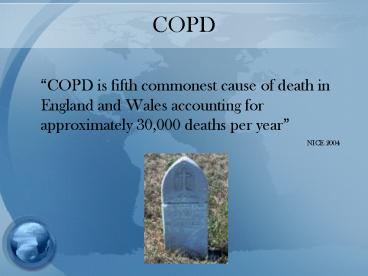COPD - PowerPoint PPT Presentation
1 / 35
Title: COPD
1
COPD
COPD is fifth commonest cause of death in
England and Wales accounting for approximately
30,000 deaths per year NICE 2004
2
So
The National Primary Care Development Team
launched a project to improve the quality of
life for these patients
3
And then
Western Sussex Primary Care Trust joined the
alliance in June 2004
4
One Light Year Ahead
5
COPD - The battle of the Cig
Jo Wadey Project Manager Tony Burrage Head of
Modernisation Western Sussex PCT
6
What is it like?
- Six elephants sitting on your chest
- Youre old before your time
- Everything but everything is a bloody effort,
even putting on your socks
7
Content
- Approach
- Practice Participation
- Patient Centred Care
- Comparative Data
- Service Developments
- Challenges
- Next Steps
8
Rhetoric into action
- Form a steering group
- Map current services
- Develop a project plan
- Recruit 7 practices initially
9
Steering Group
- Chair Head of Modernisation - PCT
- Respiratory Physicians
- Respiratory Nurse Specialists
- Respiratory Clinical Lead (GP) for 6 months
- Physiotherapist
- Occupational Therapist
- Dietitian
- Social Services
- Ambulance
- NPDT Project Manager
- Secondary Care Medical Manager
- IC_at_H Manager
- Community Matron
- (Expert Patient)
10
The Patient Journey
11
Current Services Proposals for patients with
COPD
Education Pts HCPs (2.7)
Additional Pulmonary rehab clinics (2.6) ?p
Early discharge pilot Sept 04 Reduce ALOS to 5
days(2.5) ?p
Outpatient clinics Home Visits (2.4)
Key ? Done ? Funded p Pilot
Funded
Email advice
Ambulance Guidelines
Palliative Care
Intensive care at home (2.1)
Identify training needs in Community
nursing ? (2.2)
Case managers 2.3
Social Services
Audit of resources in practices
Identify COPD Leads GP PN in each practice ?
(1.0 ) ?
Increase COPD skills in Practice
Nurses (1.3) ?
National Primary Care Project 8 Practices Reduce
admissions by 40 (1.2) ?
LES Spirometry Early identification of COPD (1.1)
? ?
Antibiotics/Steroids at home (1.7) ?
Patient education leaflet (1.8) 1600
Pharmaceutical funding
Develop COPD Register/spirometry diagnosis
Development of COPD (1.5) pathway
Develop a respiratorynetwork
Patient hand held record cards
12
(No Transcript)
13
Practice Participation
- 7 practices joined in June 2004
- 6 out of the 7 had not worked with the NPDT
- Geographical variances
14
Avisford Medical Group
15
Patient Representation
- Three patients
- 2 had diabetes COPD
- 1 had type 1 diabetes
16
Patient Education
17
Patient Centred Care
18
Patient Empowerment
19
February 2005 3rd learning workshop
80 of patients have been confirmed by
spirometry 93 of patients have a smoking status
recorded There was a marked reduction in
hospital admissions
20
Spread
- 8 more practices joined from January April 2005
15 in total (70) - Secondary care commitment
- Patient representation
- Results so far
81 92 - Smoking status recorded 47 74 -
Confirmed by spirometry
21
QOF Points Comparison Collaborative Practices
versus Non Collaborative PracticesApril 2005
22
Prevalence
23
Smoking Cessation
Local enhanced service for smoking cessation
advisors 17 out of 22 practices now have a
dedicated smoking cessation adviser
24
Education for H.C.P.s
- Training Needs Analysis
- - Spirometry
- - Ambulance
- - COPD Course for nurses
- - FAQ Meetings, i.e. differential diagnosis
- - District Nurses Community Matrons
- treatments palliative care
25
www.rwstgp.org.uk
26
Pulmonary Rehabilitation
'My breathing and general outlook are now
better'
27
I did not think I would get to the stage I am
now, and able to return to work
Pulmonary Rehabilitation Feedback
'I got great benefit from mixing with people with
the same illness and breathing problems as me -
especially as people didn't look when my
breathing was heavy'
28
Early Discharge/Supportive Discharge Pilot
- Commenced September 04
- Evaluated Jan 05 10 patients estimated 77
bed days - January 05 Supported Discharge Scheme
- 52 patients been seen
- 119 saved bed days
29
Sharing Good Practice
30
Press Release
31
Challenges
- Hospital Coding
- Admitted from AE 26.1.05 with chest
infection/asthma. This is a non smoking asthmatic
man SOLUTION H82R - Ensuring patients are not just a tick box
exercise - Lack of palliative care services
- Keeping the motivation
- Clinicians/Organisation Boundaries
32
Hospital Admissions Data
33
Where are we now?
- Integral part of the demand management
- Ensure sustainability
- Weather forecasting
- Unique Care/Community Matrons
34
Conclusion
- 70 of practices are working with the NPDT
- It has worked
- Hospital admissions have reduced
Improved patients quality of life
35
Together Everyone Achieves More
May the force be with you































